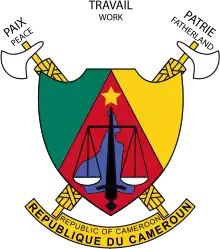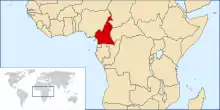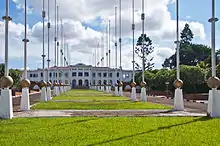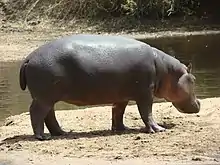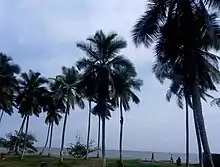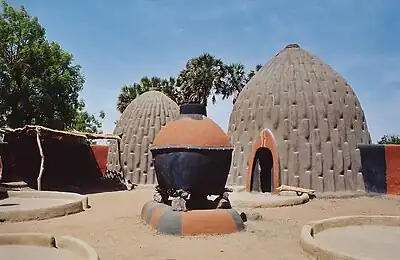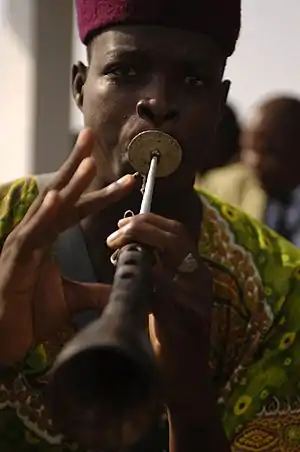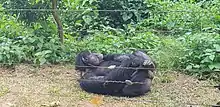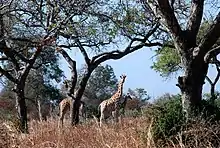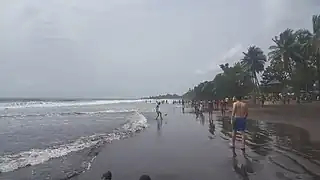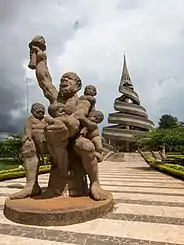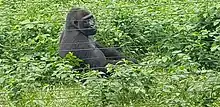The Cameroon Portal
Cameroon (/ˌkæməˈruːn/ ⓘ CAM-ə-ROON; French: Cameroun), officially the Republic of Cameroon (French: République du Cameroun), is a country in Central Africa. It shares boundaries with Nigeria to the west and north, Chad to the northeast, the Central African Republic to the east, and Equatorial Guinea, Gabon and the Republic of the Congo to the south. Its coastline lies on the Bight of Biafra, part of the Gulf of Guinea and the Atlantic Ocean. Due to its strategic position at the crossroads between West Africa and Central Africa, it has been categorized as being in both camps. Its nearly 27 million people speak 250 native languages, in addition to the national tongues of English and French, or both. Cameroon became a German colony in 1884 known as Kamerun. After World War I, it was divided between France and the United Kingdom as League of Nations mandates. The Union des Populations du Cameroun (UPC) political party advocated independence, but was outlawed by France in the 1950s, leading to the national liberation insurgency fought between French and UPC militant forces until early 1971. In 1960, the French-administered part of Cameroon became independent as the Republic of Cameroun, under President Ahmadou Ahidjo. The southern part of the British Cameroons federated with it in 1961 to form the Federal Republic of Cameroon. The federation was abandoned in favour of the unitary United Republic of Cameroon in 1972, and then reverted to the Republic of Cameroon name in 1984 by decree of President Paul Biya. Biya, the incumbent president, has led the country since 1982 following Ahidjo's resignation; he previously held office as prime minister from 1975 onward. Cameroon is governed as a unitary presidential republic. The official languages of Cameroon are French and English, the official languages of the former French Cameroons and British Cameroons. Christianity is the majority religion in Cameroon, with significant minorities practising Islam and traditional faiths. It has experienced tensions from the English-speaking territories, where politicians have advocated for greater decentralisation and even complete separation or independence (as in the Southern Cameroons National Council). In 2017, tensions over the creation of an Ambazonian state in the English-speaking territories escalated into open warfare. (Full article...) Selected article -At the crossroads of West Africa and Central Africa, the territory of what is now Cameroon has seen human habitation since some time in the Middle Paleolithic, likely no later than 130,000 years ago. The earliest discovered archaeological evidence of humans dates from around 30,000 years ago at Shum Laka. The Bamenda highlands in western Cameroon near the border with Nigeria are the most likely origin for the Bantu peoples, whose language and culture came to dominate most of central and southern Africa between 1000 BCE and 1000 CE. European traders arrived in the fifteenth century and Cameroon was the exonym given by the Portuguese to the Wouri river, which they called Rio dos Camarões—"river of shrimps" or "shrimp river", referring to the then-abundant Cameroon ghost shrimp. Cameroon was a source of slaves for the slave trade. While the northern part of Cameroon was subject to influence from the Islamic kingdoms in the Chad basin and the Sahel, the south was largely ruled by small kings, chieftains, and fons. Cameroon as a political entity emerged from the colonization of Africa by Europeans. From 1884, Cameroon was a German colony, German Kamerun, with its borders drawn through negotiations between the Germans, British, and French. After the First World War, the League of Nations mandated France to administer most of the territory, with the United Kingdom administering a small portion in the west. Following World War II, the League of Nations' successor, the United Nations, instituted a Trusteeship system, leaving France and Britain in control of their respective regions, French Cameroon and British Cameroon. In 1960, Cameroon became independent with part of British Cameroons voting to join former French Cameroon. Cameroon has had only two presidents since independence and while opposition parties were legalized in 1990 only one party has ever governed. Cameroon has maintained close relations with France and allied itself largely with Western political and economic interests throughout the Cold War and into the twenty-first century. This consistency gave Cameroon a reputation as one of the most stable countries in the region. In 2017, tensions between Anglophone Cameroonians in former British territory and the Francophone-dominated government led to an ongoing civil war known as the Anglophone Crisis in the west of the country, while Islamist insurgents Boko Haram continue to carry out military and terror attacks in the north of the country. (Full article...)Did you know (auto-generated)No recent additions More did you know -General images -The following are images from various Cameroon-related articles on Wikipedia.
WikiProjects
TopicsCategoriesCategory puzzle Select [►] to view subcategories
Cameroon Cameroon-related lists Buildings and structures in Cameroon Cameroonian culture Economy of Cameroon Education in Cameroon Environment of Cameroon Geography of Cameroon Government of Cameroon Health in Cameroon History of Cameroon Cameroonian logos Organizations based in Cameroon Cameroonian people Politics of Cameroon Society of Cameroon Cameroon stubs Related portalsAssociated WikimediaThe following Wikimedia Foundation sister projects provide more on this subject:
Discover Wikipedia using portals
| ||||

